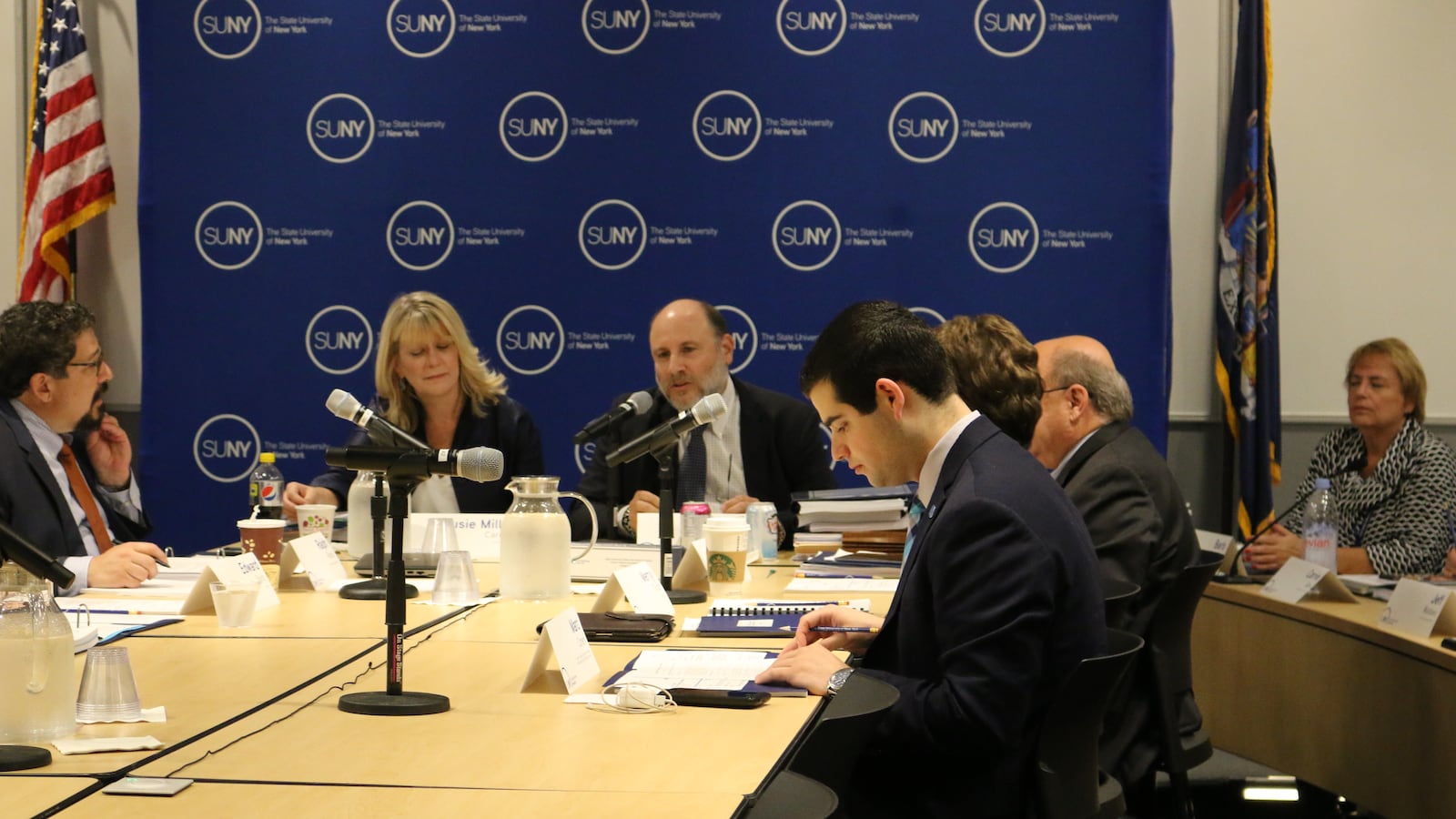Dozens of charter schools across New York can now apply to certify their own teachers after the State University of New York’s charter school committee approved new regulations, over the vehement objections of teachers unions and state officials.
In charter schools overseen by SUNY that apply to train their own teachers, prospective teachers now will only have to sit for the equivalent of a month of classroom instruction and practice teaching for 40 hours before becoming certified. And unlike teachers on a traditional certification path in New York, they will not be required to earn a master’s degree or take all of the state’s teacher-certification exams.
Despite pushback, members of the SUNY Board of Trustee’s charter school committee voted 4 to 1 Wednesday to approve the regulations. Supporters argued that they are necessary to fill hiring gaps at high-performing charter schools.
“I believe there is a substantial need for additional teachers in the charter system,” said SUNY board member Edward Spiro. “I would suggest that the proposed regulation may increase [teacher] quality by broadening the pool of candidates for charters to choose from.”
After the vote, the city and state teachers unions said they would challenge the new rules in court.
State Education Commissioner MaryEllen Elia and Board of Regents Chancellor Betty Rosa released a joint statement Wednesday condemning the regulation, which they called “an insult to the teaching profession.” The new rules lower the standards for teachers in SUNY-authorized schools, opening the door to educators with limited experience and training, they said in the statement.
“With this irresponsible action, the SUNY Charter Schools Committee has eroded the quality of teachers in New York State and negatively impacted student achievement,” they said.
Some 167 charter schools across the state — 147 of them in New York City — received their charters from SUNY. In order to apply to certify their own teachers under the new regulation, they must meet certain performance benchmarks and receive SUNY’s approval. Officials said they expect to begin accepting applications this year.
Large charter school networks that already run their own teacher-training programs are likely to benefit from this option, which Success Academy has championed. The networks and other charter advocates argue that their programs better prepare teachers for the day-to-day work of teaching than many traditional higher-education programs.
Achievement First provides five weeks of training to its incoming teachers, along with weekly professional development for all teachers, according to Fatimah Barker, Achievement First’s chief external officer. Those trainings are built around the network’s particular brand of instruction in a way that outside master’s programs would not be, Barker said.
“Ours is very tailored to what kids need,” she said.
Additionally, the regulation will allow charters to recruit teachers from a broader range of backgrounds — including more teachers of color, who are disproportionately excluded from traditional certification routes. Black and Hispanic teachers are about twice as likely as white teachers to have been certified through an alternative program, according to national data.
The traditional path to becoming a teacher in New York is to study education in college and pass a series of exams to earn an initial certification, then earn a master’s degree and teach for three years to become fully certified. There are also alternative routes, which SUNY’s certification plan resembles — though it does not require teachers to attend a college-run training program.
State education leaders and teachers unions have attacked SUNY’s certification plan since it was proposed.
Many of the objections centered on the limited amount of training that would be required of prospective teachers, which critics warned would put unqualified teachers in front of classrooms often filled with low-income students of color. (During Wednesday’s vote, some protestors held up signs calling the proposed regulations racist.)
In response to the pushback, SUNY published updated rules last weekend that increased the amount of required classroom instruction aspiring teachers must sit for and added a requirement that they pass one traditional certification exam or an equivalent test. The revisions also reduced the number of required practice-teaching hours.
On Wednesday, teachers unions and other critics erased all doubt that the changes would quell their concerns as they bashed the proposal and threatened to challenge the rule in court.
Michael Mulgrew, the head of the city teachers union, blasted the proposal and promised, “We will be suing if this board takes action.”
Mulgrew’s message came after the Alliance for Quality Education, a union-backed group, threatened similar legal action late Tuesday. The group claimed that SUNY officials violated state law by failing to give the public time to comment on the revised regulations. (SUNY officials said the changes were not significant enough to warrant another public-comment period.)
“The committee can amend this bad proposal until the cows come home,” said Andy Pallotta president of the state teachers union, in a statement after the vote, “but it doesn’t change the fact that these regulations sell out the state’s most vulnerable children to score political points.”

